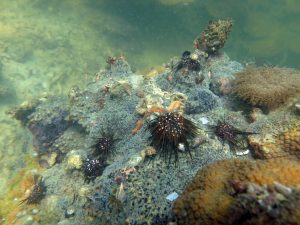When it gets “harder and harder to breathe” on a coral reef
[all photos by Maggie Johnson]
Postdoc Maggie Johnson is a lead author on a new paper that describes the impacts of an acute hypoxia event on a coral reef off the Caribbean coast of Panama. You can find a great description of the work in this press release and can read the full paper here.

In a nutshell, hypoxia can severely impact reefs on a local scale. The event observed by Johnson and colleagues caused a 50% loss of live corals, major changes to the community of benthic macro-organisms, and a dramatic shift in the microbial community. Interestingly, the microbial community returned to baseline conditions after about a month. The observations suggest that diversity within the resident microbial community enables quick responses but that the community is resilient following disturbance. In contrast, corals and other macro-organisms would be expected to return more slowly toward baseline conditions. An interesting area for future research is whether and how the microbial community might facilitate recovery of the community of reef macro-organisms.
At WHOI Maggie is building on this general area of research by studying how corals physiologically respond to hypoxia. She is analyzing both corals collected from the field and corals experimentally exposed to hypoxia in the lab. A key method she is using is Tag-Seq, a high throughput sequencing method that will allow her to identify changes in coral gene expression associated with hypoxia exposure.